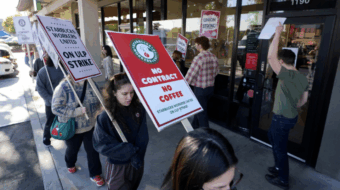
PHILADELPHIA—In all the justified angst and worry over the right-wing/white supremacist-nationalist threat to the future of U.S. democracy, the everyday actions of rank-and-file citizens may be a secret weapon against it.
That’s one conclusion that could be drawn from a special panel on voting, suppression and elections held during the AFSCME Convention in Philadelphia this past summer.
The speakers were activists from outside citizen-oriented groups from Houston, Flint, Mich., and Wisconsin. AFSCME asked that names not be used as the session was technically open only to convention delegates.
But open or closed, the group leaders described actions they and their members are taking to protect democratic government from the ravages of the right. And in cases they described, AFSCME was right alongside them, working in the same cause.
The Flint speaker, who had grown up and moved away, returned to his city just as its water crisis broke several years ago. Michigan public health/pediatrics professor Mona Hanna-Attisha’s investigation revealed Flint’s drinking water was laced with lead, after a political changeover from clean Lake Erie water to dirty Flint River water.
The changeover was ordered by a “czar” named by the state’s Republican governor, ostensibly to straighten out Flint’s finances, by taking control of everything. To save money on water treatment chemicals, the czar fouled the water.
That water eroded the majority-minority city’s ancient water pipes, loosing the lead within them—a pipe-lining problem that plagues urban and rural water systems nationwide. Flint children were poisoned with lead, which stunts brain development. Years later, residents still drink bottled water. Tap water is virtually useless.
“AFSCME knew something wasn’t right with us,” he said, adding similar GOP-named czars imposed their rules on Detroit’s schools and on the city of Benton Harbor, both also majority-minority. But the union didn’t just provide bottled water.
Instead, it aided construction of community coalitions to help take power back from the overseers, who were named at the behest of the pro-corporate Republican state government.
The Republican-gerrymandered legislature, which created the czars, has responded with voting restrictions, but citizen referendums have moved Michigan in the other direction, that state’s speaker, who grew up in an Auto Worker household, said.
“Why are they attacking voting rights? This is about power,” he declared.
And long before the radical right started its current drive to curb workers, women and people of color, corporations were doing the same thing, “by pitting us one against the other” often on racial lines, he added. The workers saw through it.
“The only reason we have s—, kid, is because we took on the most-powerful corporation in the world,’” a female retiree from UAW Local 651 told him as a youngster.
Same scenario, different issue
Same scenario, different issue—immigration—in a different city, Houston. There, the political powerlessness of its Hispanic community showed up in the streets, literally, she said. “How much we get paid is determined by law, and how many of our potholes are filled is determined by elected officials,” she explained.
“Every day, our leaders” in Republican-dominated Texas “wake up saying ‘How can we suppress the voters further?’ Because they know that if we’re voting, we win.”
In Houston, the solution is “to chip away” at the Texan establishment, local office by local office and campaign by campaign. Eventually, they predict Texas will be a swing state, not a deep red Republican one.
In the meantime, to preserve democracy in Texas, or try to, they built “a multi-issue organization,” starting in Houston, Austin and San Antonio. It united residents—many of them people of color—around the issues of comprehensive immigration reform, improved and affordable housing, neighborhood infrastructure and access to and improving schools.
“It takes a lot of gumption to keep doing this, but eventually we will be one of the most pro-union states,” she predicted.
That may take a while. Texas is a right-to-work state, hobbling unions by denying them funds while forcing them to represent even free riders.
And its labor laws allow state and local employee unions—AFSCME, the two teachers unions, the Communications Workers and a few others—to “meet and confer” with bosses about issues and grievances, but not to bargain over wages and working conditions.
The Wisconsin representative spoke for a group which lawyers began to defend voting rights in the Badger State, which also happens to be where AFSCME was founded. But since the 2010 Republican electoral takeover, aided and abetted by subsequent Republican gerrymandering, the legislature has turned sharply anti-union.
Those state legislative majorities have been enacting barriers to voting, especially focusing on the Democratic strongholds of the cities of Milwaukee and Madison. And the citizen activists, and the lawyers, have found an additional barrier: The courts, which she said “have been captured by conservatives from the Supreme Court on down.”
All this grass-roots action, the three said, helps counter what the Texan said is “the one way people in power want to ensure that” they keep it: “By squashing our vote.”
“So having local elected officials who look like us, who are one of us, is critical,” she added. Some gains have been there, including electing the Harris County (Houston) Judge, the county’s chief executive officer.
Texas’s ruling Republican elite has countered with more voter repression, specifically outlawing methods—24-hour voting, drive-through voting, souls to the polls and others—which citizen groups and unions used to enhance voter turnout in 2018 and 2020.
Other Republican-dominated states followed Texas’s lead. AFT Secretary-Treasurer Fed Ingram, head for 10 years of Education Florida, says his state is as bad as Georgia.
Help from AFSCME
While the citizens’ groups, with aid from AFSCME, other unions and other progressives, keep waging the fight on the state and local levels, they still recognize the battle for democracy is nationwide—and must be won in the halls of Congress.
And there, Republican rule, principally through the filibuster and blocking votes on massive and comprehensive electoral reform, holds sway.
“Restrictions are aimed at making sure working-class folks can’t make it to the ballot box to cast their votes,” the Michigan man said. “We see minority rule locked in.
“In America, the story most people believe is ‘one person, one vote,’” he continued. That standard has been in effect only since the mid-1960s, when the U.S. Supreme Court mandated it.
“But our system is built to undermine that story. Everything from the Electoral College to the filibuster to the gerrymander is built to do that.”
“In Wisconsin, the gerrymander is the key,” that speaker said, referring to a state legislature so gerrymandered that Republicans won under 45% of the vote in state legislative races, and 63% of the seats. “If it wasn’t we’d look a lot different.”
“One thing we can do is elect United States senators who will get rid of the filibuster and pass the Freedom to Vote Act,” the massive and comprehensive electoral reform legislation, HR1, which the Democratic-run House approved early in the 117th Congress, she said.










